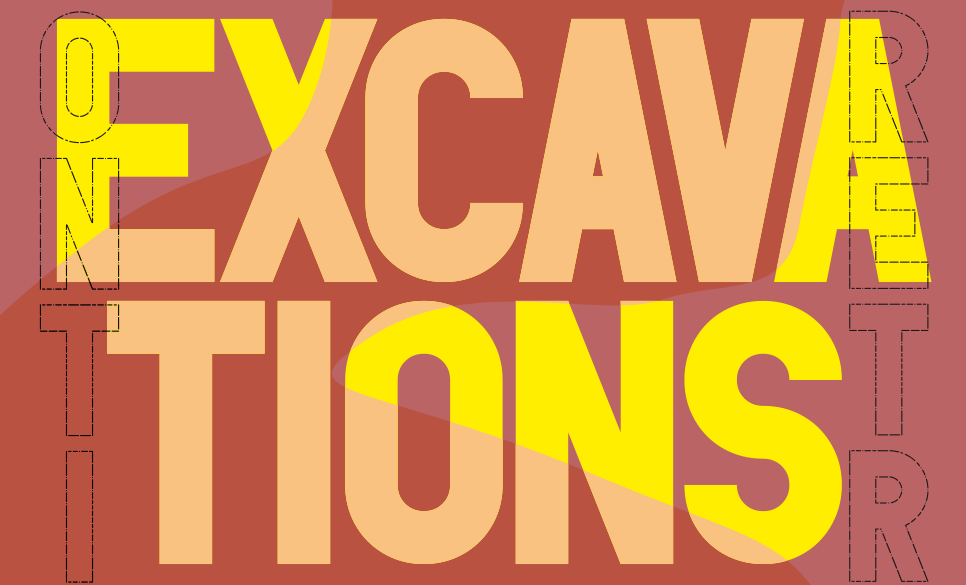4 Dec 2018
Events
Frontiers in Retreat: Excavations
13 June – 30 August, HIAP Gallery Augusta, Suomenlinna
Welcome to the opening on Helsinki Day, 12 June, 6-10 pm!
Artists:
Carl Giffney (Dublin, Offaly)
Tue Greenfort (Berlin)
Barbara Knezevic (Dublin)
Tuomas A. Laitinen (Helsinki, Los Angeles)
Hanna Ljungh (Stockholm)
Mirko Nikolić (London, Belgrade)
The BodyBuilding Project (Helsinki, Berlin, NYC, Washington D.C.)
Curator Jenni Nurmenniemi (HIAP) in dialogue with Saara Hannula (The BodyBuilding Project)
EXCAVATIONS
The second international group exhibition organised by HIAP within the Frontiers in Retreat project (2013–2018) moves between underground and aboveground in both theme and method. The artists explore historical and emergent dependencies between beings, things, and worldly phenomena through acts of surfacing, exposing, extracting, re-assembling, redirecting and rehearsing.
The exhibition therefore functions as a site for various forms of artistic excavations. Matter, its circulation and connectedness are examined from the levels of microorganisms and minerals; bodies; and the macro metabolism of the Earth. The gallery space becomes both a mine and a testing ground for new possibilities of coexistence.
Throughout the 2015 summer, Gallery Augusta will be inhabited by The BodyBuilding Project, a perennial collaboration consisting of ongoing artistic research processes and a series of public events. The project is formed by changing open constellations of both human and nonhuman participants It aims to develop ways of sensing and relating to phenomena, such as climate change, that are too vast to be experienced and understood.
Diving deep into the often obscure global flow of materials, in this instance copper, the new video Powder of Sympathy (2015) by Tuomas A. Laitinen sets in motion a frantic flow of images combined with feverish pounding, hissing and rattling sounds sourced from West Africa, the USA and China. Accompanied by Jenna Sutela’s narrative script, the video tracks the mythical and chemical characteristics of copper. Beginning with its healing properties then progressing to its conductive role in the development and continuity of electricity-dependent modern societies, the work’s occasionally disrupted images dissolve into entropy.
At the start of his two-year Frontiers in Retreat artist project, Mirko Nikolić works to expose and alter the ways in which humans and metals interact. With the aim of blowing up the persistent divide between animate and inanimate matter, his ongoing artistic research project we (heart) Cu & Cu (heart) us (2015–) explores cultural meanings and representations attached to copper. From the abyss of the internet, Nikolić mines visual and textual references related to this metal, ranging from copper coloured hair to construction materials. He recirculates these representations via a website and “contaminates” them with an unexpected vocabulary of love. By collating the metallic final products and their representations, Nikolić brings attention to the global desire to mine, extract, and refine raw materials.
Bronze is widely associated with coming third and a position of ‘thirdness’. Carl Giffney has used this metal to cast a pair of 12 kg clogs, within which he painstakingly hitchhiked and trekked throughout Finland during his February 2015 residency in Mustarinda, Hyrynsalmi. His curiosity about the possibility of a third space beyond the persistent dichotomies of independence and dependence motivated him to use the bronze shoes as a tool for discussion. Presenting these concepts to those he encountered in parts of Finland, Scotland and the Netherlands, the journey became nothing short of an epic saga.
On the surface, Hanna Ljungh’s sculptures resemble geological cross sections in their rich layering of colourful minerals. Upon closer examination, they consist of manmade materials and residues of contemporary human life. Would the geological cross sections extracted after our time actually have this composition? Ljungh’s pillars expose the geological strata of the Anthropocene, the era in which humans have turned into a force of nature. Despite these post-human associations, the sculptures playfully tackle the passage of time and confuse the borders between the natural and manmade.
Barbara Knezevic’s work is concerned with how objects function materially, ontologically and economically in the world, and the unruly nature of matter. Her work considers the peculiar human relationship to the things around us typified by the art-object. Knezevic assembles and forms everyday materials into temporary sculptural arrangements. They are simple in their composition; Knezevic seeks the barest most economical intervention into the materials. Thus, they maintain their capacity of returning again to their unadulterated state – before they became artworks.
Connectedness and rhizomatic dependencies between organisms and various matter are examined in Tue Greenfort’s sculptural mycology. Greenfort initiated his mushroom-cultivating research during his first Frontiers residency at HIAP in Summer 2014, when he fed Pleurotus Mychorriza mushrooms Cartesian thinking via a Finnish edition of René Descarte’s 1899 methodological essay. This time, mushrooms again act as agents of the artwork, informing rhizomatic ways of existing and decomposing beyond dualist thinking.
The exhibition space will be used to rethink subjectivities and practice new ways of co-existing with other beings within the precarious parameters of the early 21st century. In dialogue with the space and the artworks exhibited, the members of The BodyBuilding Project aim to establish a continuous collective practice that visitors can join at will. Their aim is to figure out what kind of sensibilities, subjectivities and relational capacities we, as beings and as a species, would need to develop in order to better respond to the uncertainties and ecological urgencies we are currently facing. Together, they hope to develop a series of relational practices to help us to begin building bodies capable of projecting life beyond our collapsing horizons.

